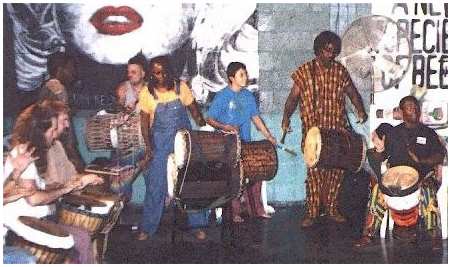
Community Drumming
Towards a Universal Approach. . .
 Mamady Keita holding class in Dallas, 1996 (photo Happy Shel) |
|
| Here in the 21st century, it's obvious to those of us involved in it that the world percussion scene here in the US is slamming, to say the least. | Many
African teachers are immigrating to ther United States, bringing their
undiluted traditions along, and the result is a big influx of new
rhythmaculture into the already diverse US scene...
Welcome, and come on in... |
| Take Dallas, for instance: a steady stream of good teachers from various traditions have been through here lately, sharing their talents and insight with the drummers in town. Up in Denton, the University of North Texas now has percussion ensembles specializing in afro-cuban, Brazilian, African, Gamelan, Indian, etc.Many of these classes are taught by excellent teachers from around the globe.( When I was studying there in the mid 70s, it was mostly just legit and jazz. Still quite beneficial, but not as diverse.) When we add to all this the availability of videos and the resources of the Net, we are presented with a vast body of music, there for anyone with the discipline and energy to delve into it. It really is a wonderful time to be a musician; if only there were more hours in the day. | |
Upon deeper scutiny, though, we as drummers seem to be faced with a bit of a dilemma. Many of these styles have taken many centuries to develop illustrious traditions, worthy of respect and awe. Enter the community drum circle. Now they are dumped into the great global melting pot, to be played (often badly) by people who have no understanding of the intricacies of the culture from which they came. Something is surely lost here, yet we cannot realistically expect any culture to remain as it was before globalism. People will be people, and music, like all culture, is a living thing that changes in response to stimuli. These are the most sweeping, far reaching changes in the history of the human race. Our task as musicians is to facilitate the cultural changes while doing justice to those who came before us, and passing this body of knowledge to those who are to come.
With so much to be done, it is good that our team is so diverse. Some of us gravitate towards a particular tradition, learning it in a relatively unaltered form. Others explore new avenues made possible by the bringing together of various styles. Either path, trod to the end, leads to the discovery of the universal principles of drumming, indeed of all music: time and tone, intention and awareness.
All that can be expressed through music must emerge through the twin dynamics of time and tone. Grace, clumsiness, majesty, baseness, come through those two: the sound itself, and the timing. The timid beginner, the overbearing strong man and the master all can be recognized by the sounds they make. Time and tone are fundamental, and can only be developed through continued practice.
Likewise, a player fully aware of the music being made and it's effects, fully tuned in to what is going on around and within him/her is worth his/her weight in gold to the community, regardless of which tradition he/she studied. And, as players develop, they begin to understand the relationship between their intentions and the effects of their action on themselves and others. Intention is crucial; why are you playing? For some, the community drum circle is a group work of art, for others it's an atheletic event, still others see a way to hustle the opposite sex; and one's intentions are plain for all to see and hear, streaming out with the time, tone and body language.
Sure, it's important to respect and study the traditions. It is silly to skip over the tips and tricks gleaned from centuries of practice, and thereby miss the deeper spiritual aspects of the music. But without serious practice, and purity of intention, the deeper aspects of drumming will be inaccessible, no matter what style you choose or who your teacher is. This is a universal law, regardless of culture.
Respect for cultural origins is fundamental, growing from a basic respect for oneself and others; carried too far, pride in one's culture turns to cultural chauvinism, racism, nationalism, and religious bigotry. A balance must be acheived. The universal principles always apply, and underscore the essential unity of mankind.
| Discipline Respect Unity Music |
Time,
tone,awareness, intention. . .These are the fundamentals
that tie together all the styles, and practice is the key to developing
these. |
Intent Page . Peace Through World Music Home . Hall of Fame . About Community Drumming . Woodshed . Spirit Links . Rhythmweb Home